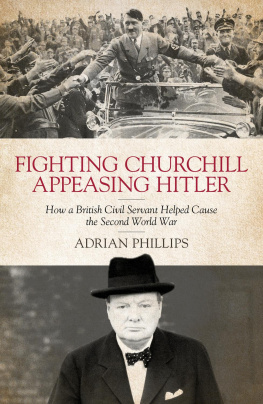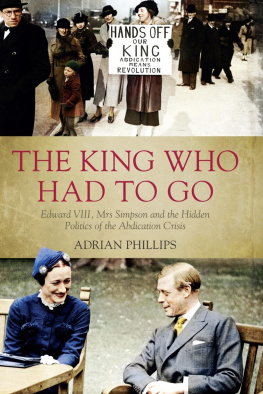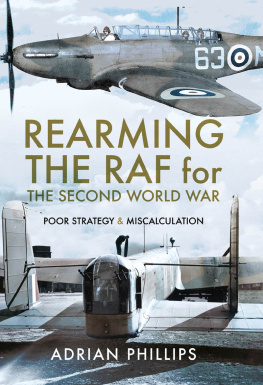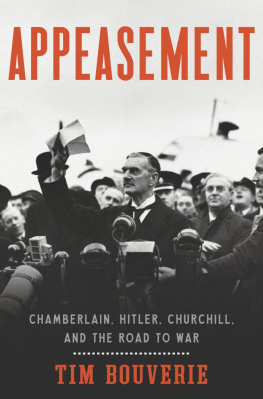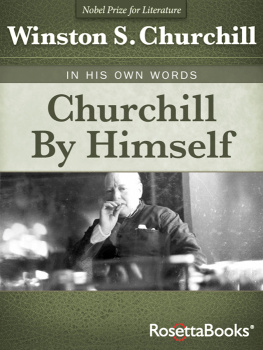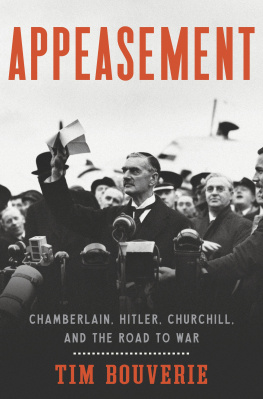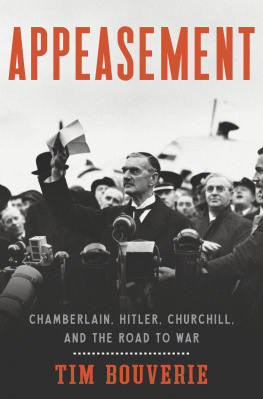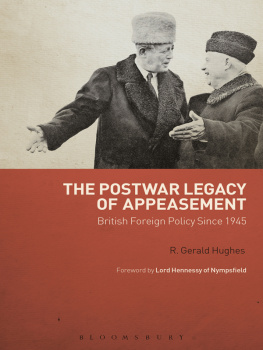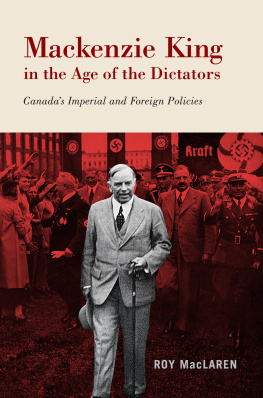Appeasement, now a dirty word, was once quite respectable.
L ORD S TRANG , B RITAIN IN W ORLD A FFAIRS
I n 1941, as his time in office drew to a close, the head of the British Civil Service, Sir Horace Wilson, sat down to write an account of the government policy with which he had been most closely associated. It was also the defining policy of Neville Chamberlain, the Prime Minister whom Wilson had served as his closest adviser throughout his time in office. It had brought Chamberlain immense prestige, but this had been followed very shortly afterwards by near-universal criticism. Under the title Munich, 1938, Wilson gave his version of the events leading up to the Munich conference of 30 September 1938, which had prevented or, as proved to be the case, delayed the outbreak of another world war at the cost of the dismemberment of Czechoslovakia. By then the word appeasement had acquired a thoroughly derogatory meaning. Chamberlain had died in 1940, leaving Wilson to defend their joint reputation. Both men had been driven by the highest of motivations: the desire to prevent war. Both had been completely convinced that their policy was the correct one at the time and neither ever admitted afterwards that they might have been wrong.
After he had completed his draft, Wilson spotted that he could lay the blame for appeasement on someone elses shoulders. Better still, it was someone who now passed as an opponent of appeasement. In an amendment to the typescript, he pointed out that in 1936, well before Chamberlain became Prime Minister, Anthony Eden, the then Foreign
Wilsons statement was perfectly accurate, but it entirely distorted the truth, because it ignored how rapidly and completely the meaning of the word appeasement had changed. When Eden first used the word, it had no hostile sense. It meant simply bringing peace and was in common use this way. Appease also meant to calm someone who was angry, again as a positive act, but Eden never said that Britains policy was to appease Hitler, Nazi Germany, Mussolini or Fascist Italy. Nor, for that matter, did Chamberlain use the word in that way. The hostile sense of the word only developed in late 1938 or 1939, blending these two uses of the word to create the modern sense of making shameful concessions to someone who is behaving unacceptably. The word appeasement has also become a shorthand for any aspect of British foreign policy of the 1930s that did not amount to resistance to the dictator states. This is a very broad definition, and it should not mask the fact that the word is being used here in its modern and not its contemporary sense. The foreign policy that gave the term a bad name was a distinct and clearly identifiable strategy that was consciously pursued by Chamberlain and Wilson.
When Chamberlain became Prime Minister in May 1937, he was confronted by a dilemma. The peace of Europe was threatened by the ambitions of the two aggressive fascist dictators, Hitler in Germany and Mussolini in Italy. Britain did not have the military strength to face Germany down; it had only just begun to rearm after cutting its armed forces to the bone in the wake of the First World War and was at the last gasp of strategic over-reach with its vast global empire. Chamberlain chose to solve the problem by setting out to develop a constructive dialogue with Hitler and Mussolini. He hoped to build a relationship of trust which would allow the grievances of the dictator states to be settled by negotiation and to avoid the nightmare of another war. In other words, Chamberlain sought to appease Europe through discussion and engagement. In Chamberlains eyes this was a positive policy and quite distinct from what he castigated as the policy of drift that his predecessors in office, Ramsay MacDonald and Stanley Baldwin, had pursued. Under their control, progressive stages in aggression by the dictators had been met with nothing more than ineffectual protests, which had antagonised them without deterring them.
Chamberlains positive approach to policy was the hallmark of his diplomacy. He wanted to take the initiative at every turn, most famously in his decision to fly to see Hitler at the height of the Sudeten crisis. Often his initiatives rested on quite false analyses; quite often the dictators pre-empted him. But Chamberlain was determined that no opportunity for him to do good should be allowed to escape. The gravest sin possible was the sin of omission. At first his moves were overwhelmingly aimed at satisfying the dictators. Only after Hitlers seizure of Prague in March 1939 did deterring them from further aggression become a major policy goal. Here, external pressures drove him to make moves that ran counter to his instincts, but they were still usually his active choices. Moreover, the deterrent moves were balanced in a dual policy in which Hitler was repeatedly given fresh opportunities to negotiate a settlement of his claims, implicitly on generous terms.
Appeasement reached its apogee in the seizure of Prague in 1939. Chamberlain was the driving force behind the peaceful settlement of German claims on the Sudetenland. He was rewarded with great, albeit short-lived, kudos for having prevented a war that had seemed almost inevitable. He also secured an entirely illusory reward, when he tried to transform the pragmatic and unattractive diplomatic achievement of buying peace with the independence of the Sudetenland into something far more idealistic. Chamberlain bounced Hitler into signing a bilateral Anglo-German declaration that the two countries would never go to war. Chamberlain saw this as the first building block in creating a lasting relationship of trust between the two countries. It was this declaration, rather than the dismemberment of Czechoslovakia under the four-power treaty signed by Britain, France, Germany and Italy, that Chamberlain believed would bring peace for our time, the true appeasement of Europe. At the start of his premiership, Chamberlain had yearned to get on terms with the Germans; he thought that he had done just that.
Appeasing Europe through friendship with the dictators also required the rejection of anything that threatened this friendship. One of the most conspicuous threats was a single individual: Winston Churchill. Almost from the beginning of Hitlers dictatorship Churchill had argued that it was vital to Britains interests to oppose Nazi Germany by force, chiefly by rearming. Unlike most other British statesmen, Churchill recognised in Hitler an implacable enemy and he deployed the formidable power of his rhetoric to bring this home in Parliament and in the press. But Churchill was a lone voice. When he had opposed granting India a small measure of autonomy in the early 1930s, he had moved into internal opposition to the Conservative Party. Only a handful of MPs remained loyal to him. Churchill was also handicapped by a widespread bad reputation that sprang from numerous examples of his poor judgement and political opportunism.
Chamberlain was determined on a policy utterly opposed to Churchills view of the world. He enjoyed a very large majority in Parliament and faced no serious challenge in his own Cabinet. Chamberlain and Wilson were so convinced that their policy was correct that they saw opposition as dangerously irresponsible and had no hesitation in using the full powers at their disposal to crush it. Churchill never had a real chance of altering this policy. It would have sent a signal of resolve to Hitler to bring him back into the Cabinet, but this was precisely the kind of gesture that Chamberlain was desperate to avoid. Moreover, Chamberlain and Wilson each had personal reasons to be suspicious of Churchill as well as sharing the prevalent hostile view of him that dominated the political classes. Wilson and Churchill had clashed at a very early stage in their careers and Chamberlain had had a miserable time as Churchills Cabinet colleague under Prime Minister Stanley Baldwin. Chamberlain and Wilson had worked closely to fight a largely imaginary and wildly exaggerated threat from Churchills support for Edward VIII in the abdication crisis of 1936.

